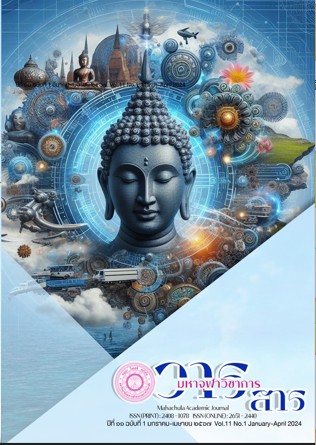An Approach for Buddhist Principles to Promote Educational Quality Assurance at the Institutional Level in Graduate Production of Mahachulalongkornrajavidyalaya University
Main Article Content
Abstract
The study consisted of the following objectives: (1) to investigate problems and obstacles of educational quality assurance at the institutional level in producing graduates of Mahachulalongkornrajavidyalaya University; (2) to explore the Buddhadhamma promoting educational quality assurance at the institutional level in producing graduates of Mahachulalongkornrajavidyalaya University; and (3) to present an approach to applying the Buddhadhamma to promote educational quality assurance at the institutional level in producing graduates of Mahachulalongkornrajavidyalaya University. The study employed a qualitative research method by studying from documents and conducting interview with 10 key informants. Also, content analysis was conducted, and findings were presented as a narrative synthesis.
The results of the research revealed that (1) The assessment of curriculum quality during three academic years (B.E. 2562 - 2564) revealed that the curriculum cannot raise the quality from medium to good or excellent. There are curriculums that have been assessed to be of lower quality than the standards in each educational level. Lecturers with doctorates have a lower academic standing than the quality assessment standards. The process of overseeing and following up on the quality development plan, which involves input data analysis by the quality assurance committee, lacks continuity. (2) Ariyasacca (the Four Noble Truths) is a Buddhadhamma that may be used to solve difficulties in producing graduates, management, operations, and university employees. It begins with identifying the problem, determining its causes, creating goals, and determining solutions for solving the problem. Then, it leads to performance according to four itthibāt: working with love, having a desire to work, being diligent, being patient, not giving up, having a mind to know what to do with concentration. Finally, planning, assessing, finding ways to fix the problem, and aparihāniyadhamma are processes to drive performance together by meeting and finding consensus in order to improve the quality of work and achievement of the organization. (3) An approach to applying Buddhadhamma to promote educational quality assurance can be done through the PDCA cycle and the IPO process. This will lead to quality throughout the organization, the accomplishment of strategic plans and operational goals, as well as the satisfaction of students and all stakeholders. As a result, the university will achieve academic excellence through Buddhist educational management.
Article Details

This work is licensed under a Creative Commons Attribution-NonCommercial-NoDerivatives 4.0 International License.
References
กองแผนงาน สำนักอธิการบดี มหาวิทยาลัยมหาจุฬาลงกรณราชวิทยาลัย. แผนพัฒนามหาวิทยาลัยมหาจุฬาลงกรณราชวิทยาลัย ระยะที่ ๑๓ (พ.ศ. ๒๕๖๖-๒๕๗๐) ฉบับเผยแพร่, ๒๕๖๕.
คณะกรรมการจัดทำแผนยุทธศาสตร์การประกันคุณภาพการศึกษา มหาวิทยาลัยมหาจุฬาลงกรณราชวิทยาลัย. แผนยุทธศาสตร์การประกันคุณภาพการศึกษา มหาวิทยาลัยมหาจุฬาลงกรณราชวิทยาลัย พุทธศักราช ๒๕๖๖-๒๕๗๐, ๒๕๖๕.
ถิรนันท์ ปาลี. “การประเมินคุณภาพระบบการประกันคุณภาพการศึกษามหาวิทยาลัยเชียงใหม่”. การค้นคว้าอิสระ ปริญญารัฐประศาสนศาสตรมหาบัณฑิต สาขาวิชารัฐประศาสนศาสตร์. บัณฑิตวิทยาลัย: มหาวิทยาลัยเชียงใหม่, ๒๕๕๓.
ธวัชชัย ศุภดิษฐ์. “การพัฒนาแนวปฏิบัติเพื่อให้เกิดผลสัมฤทธิ์ในการประกันคุณภาพการศึกษา สถาบันบัณฑิตพัฒนบริหารศาสตร์”. รายงานการวิจัย. สถาบันบัณฑิตพัฒนบริหารศาสตร์, ๒๕๕๗.
เนตรฤทัย ภูนากลมและวิรมณ กาสีวงศ์. “การศึกษาสภาพปัญหาและแนวทางการพัฒนากระบวนการประกันคุณการศึกษาของวิทยาลัยพยาบาลบรมราชชนนีนครพนม มหาวิทยาลัยนครพนม”. รมยสาร. ปีที่ ๑๕ ฉบับที่ ๒ (พฤษภาคม-สิงหาคม ๒๕๖๐): ๑๗๕-๑๗๔.
บดินทร์ภัทร์ สายบุตร. “กระบวนการพัฒนาระบบประกันคุณภาพการศึกษาตามวงจร PDCA ของมหาวิทยาลัยมหาจุฬาลงกรณราชวิทยาลัย”. วารสารวิจยวิชาการ. ปีที่ ๒ ฉบั่บที่ ๑ (มกราคม-เมษายน ๒๕๖๒) : ๔๖.
ปรีดี กุมเมฆและคณะ. “แนวทางการประเมินคุณภาพการศึกษาภายในของสถาบันอุดมศึกษา”. วารสารวิชาการแพรวากาฬสินธุ์ มหาวิทยาลัยกาฬสินธุ์. ปีที่ ๒ ฉบับที่ ๓ (กันยายน-ธันวาคม ๒๕๕๘) : ๙๖-๙๘.
พระครูสาครธรรมวิธาน (อนุชา ถินแพ). “การพัฒนาทรัพยากรมนุษย์ในระดับองค์กรตามแนวพระพุทธ ศาสนา”. วารสาร มจร กาญจนปริทรรศน์. ปีที่ ๑ ฉบับที่ ๑ (มกราคม-เมษายน ๒๕๖๔) : ๖๔-๖๕.
พระนพสิทธิ์ สุทฺธจิตโต. “กระบวนการบริหารตามหลักธรรมภิบาลเชิงพุทธ ขององค์การบริหารส่วนตำบลบ้านเอื้อม อำเภอเมือง จังหวัดลำปาง”. วารสารสันติศึกษาปริทรรศน์ มจร. ปีที่ ๗ ฉบับที่ ๔ (กรกฎาคม-สิงหาคม ๒๕๖๒) : ๑๐๑๖.
พระพุฒิพันธุ์ จนฺทวํโส. “ธรรมภิบาลในพระไตรปิฎก”. พุทธจักร. ปีที่ ๗๔ ฉบับที่ ๑ (มกราคม ๒๕๖๓) : ๗๖-๗๗.
พระมหาจรูญ อภิธมฺมจิตโต. “หลักธรรมเพื่อการบริหารตน บริหารคน และบริหารงาน”. การประชุมวิชาการระดับชาติ มจร ครั้งที่ ๓. (๓๑ สิงหาคม ๒๕๖๒) : ๒๗๓-๒๗๖.
มหาจุฬาลงกรณราชวิทยาลัย. พระไตรปิฎกภาษาไทย ฉบับมหาจุฬาลงกรณราชวิทยาลัย. กรุงเทพมหานคร: โรงพิมพ์มหาจุฬาลงกรณราชวิทยาลัย, ๒๕๓๙.
วีรนุช พานทอง. “แนวทางการพัฒนาแนวปฏิบัติที่ดีด้านการประกันคุณภาพการศึกษาภายใน มหาวิทยาลัยเทคโนโลยีราชมงคลธัญบุรี”. รายงานวิจัยฉบับสมบูรณ์. กองทุนส่งเสริมงานวิจัย มหาวิทยาลัยเทคโนโลยีราชมงคลธัญบุรี, ๒๕๖๑.
ศิริขวัญ ยิ่งเจริญ. “สภาพและปัญหาในการดำเนินการประกันคุณภาพการศึกษา มหาวิทยาลัยราชภัฏราชนครินทร์”. วิทยานิพนธ์ปริญญาศึกษาศาสตรมหาบัณฑิต สาขาวิชาวิจัยและประเมินผลการศึกษา. บัณฑิตวิทยาลัย: มหาวิทยาลัยเกษตรศาสตร์, ๒๕๕๓.
Eliana Minelli, etc. “The fifteen year evaluation experience in Italian universities with its crisis factors and a desire for Europe”. Implementing and Using Quality Assurance: Strategy and Practice, a Selection of Papers from the 2nd European Quality Assurance Forum, 2008.
European University Association. Developing an Internal Quality Culture in European Universities 2002-2003, Report on the Quality Culture Project, EUA Publications 2005, pp. 10-11.
พระมหาสุทัศน์ ติสฺสรวาทีและคณะ. “แนวทางการพัฒนาระบบประกันคุณภาพการศึกษาภายใน มหาวิทยาลัยมหาจุฬาลงกรณราชวิทยาลัย”. [ออนไลน์]. แหล่งที่มา: https://www.mcu.ac.th/article/ detail/298 [๑๓ ธันวาคม ๒๕๖๔].
มหาวิทยาลัยมหาจุฬาลงกรณราชวิทยาลัย. “สุภาษิต ปรัชญา ปณิธาน วิสัยทัศน์และพันธกิจ”. [ออนไลน์]. แหล่งที่มา: https://www.mcu.ac.th/pages/philosophy-commitment-vision-mission [๒๑ ตุลาคม ๒๕๖๕].


